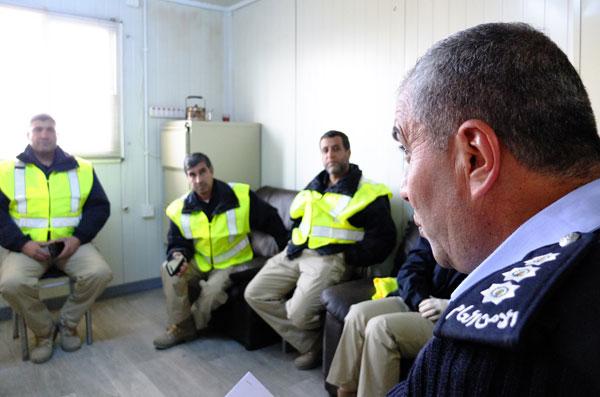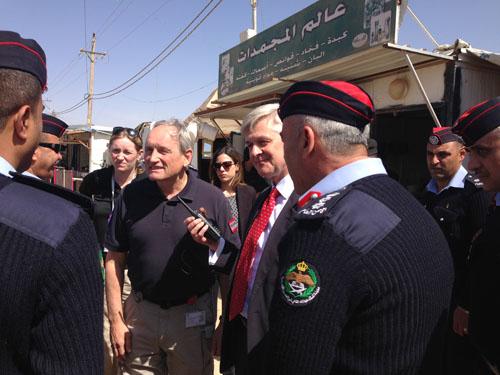You are here
Retired police officers put long, diverse experience at disposal of refugee camp dwellers
By Rana Husseini - Mar 19,2016 - Last updated at Mar 19,2016

The Community Police Assistant Programme recruits Public Security Department retirees to provide security for Syrian refugees (Photo courtesy of CPAP)
AMMAN — Retired Major Najwa Momani travels 140km every day on the Zarqa-Azraq road to patrol the streets of the Zaatari Refugee Camp to maintain the well-being of its residents.
The mother of two served at the Public Security Department (PSD) for 27 years at the traffic, the correctional and rehabilitation departments, as well as at peacekeeping missions and retired in 2014.
In late 2015, she learned about the Community Police Assistant Programme (CPAP) for PSD retirees, which aims to provide security for Syrian refugees and support Jordan’s resilience in the face of the Syrian crisis.
“I immediately applied for the programme because I served with Jordan’s peacekeeping missions in Darfour and South Sudan, and I knew that I had the necessary experience to do it,” Momani told The Jordan Times in a recent interview.
The mother of two children said her mission was to give lectures, patrol camps in Sudan and help the community “and this is what CPAP was all about, so I immediately applied and I was accepted I believe because of my experience”.
Momani was one of 44 PSD retirees that were chosen from over 800 applicants to serve in the refugee camps in Jordan, as part of the CPAP project that is supported by the British embassy Policing Support Team (PST) in cooperation with the Netherlands embassy and the PSD.
The organisers will look into hundreds of applicantions to recruit the remaining 40 retired PSD personnel by this week to be trained and deployed as Community Police Assistants or CPAs.
“My work at Zaatari entails patrolling the streets, checking on people and the needy, and connect anyone who wants to reach the police or the relevant organisations that are in the camp to assist them,” Momani explained.
One case in specific, Momani maintained, was a physically-challenged woman who delivered a baby and had no means of “providing the newborn with medical attention or food, so I immediately wrote a report and she was immediately helped by the relevant organisations.”
“I feel happy and content when I know that I am able to help a weak person who is in need and cannot have his/her voice heard. I want to be their voice,” Momani said.
Retired Major Mazin Jariry who served for 20 years at the PSD in the legal and investigation departments, was one of the chosen applicants in December and is currently serving as assistant coordinator of the community police at Azraq camp.
“I take my work very seriously and our job also entails giving moral support for the refugee community by attending their events and receiving complaints,” Jariry told The Jordan Times in a recent interview.
Jariry said the key to success in his mission is gaining the trust of the refugees and the 55 organisations working there and “linking them together while ensuring safety and security for all”.
Like his colleague Momani, Jariry, who drives 250 kilometres daily to reach the camp, said he took part in peaceful international missions in Kosovo and Bosnia “and these experiences were a bonus for me when I applied for this job”.
“I believe that what I am doing is strictly humanitarian. I am helping people and feel that I am part of the solution to this international conflict,” Jariry said.
The CPAs support the community police in Zaatari and Azraq refugee camps to serve the community by conducting foot patrols and taking reports of cases for follow up by the police and humanitarian organisations, said Alice Crabtree, the project coordinator of the British embassy PST.
“The reason why we recruit retired Jordanian PSD personnel is because they have a very rich and diverse experience in peacekeeping missions, which they can apply in the camps with the right approach to assist Syrian refugees and make them feel safer,” Crabtree told The Jordan Times in a recent interview.
Crabtree added that retired PSD personnel provide a wealth of experience across a broad range of policing fields, ranging from family protection, traffic safety and even environmental rangers as well as “their humanitarian outlook and willingness to serve the Syrian community in Jordan regardless of their previous ranks”.
“The CPA project started in November 2015 and will continue until May/June 2017 when this last cohort that we are recruiting now has finished their contract year. We are hoping to sustain the programme in the future through other donors,” the embassy official said.
The British embassy PST has been working with the PSD’s Syrian Refugee Affairs Directorate (SRAD) since 2013 to train SRAD personnel in the ethos of community policing, problem solving and communication skills as well as human rights and the rights of the refugees, according to Crabtree.
The CPAP builds on the work of the PSD’s SRAD to implement and expand community policing in Zaatari and Azraq refugee camps, according to a press release by the British embassy.
With the help of the British embassy, three community police stations have been constructed, a custom-built mobile police station has been deployed, 36 community police officers and 45 CPAs have been trained since 2013, the press release said.
In a survey carried out in Zaatari camp in February 2015, 74 per cent of respondents felt that the introduction of community police had made the camp a safer place, the press release stated.
Related Articles
AMMAN — British Ambassador to Jordan Edward Oakden launched on Thursday the “first” training course for community police assistants at Azraq
A ceremony marking the handover of infrastructure provided by Canada to the Public Security Department (PSD) and the Syrian Refugee Affairs Department was held at the Azraq Refugee Camp on Wednesday, according to an embassy statement.
AMMAN — British Ambassador to Jordan Edward Oakden handed over new radio communication equipment, worth 380,000 pounds (around JD383,522), t

















